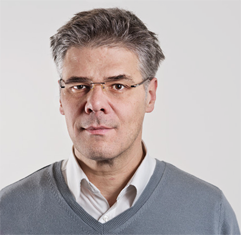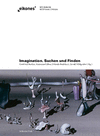Gerald Wildgruber
My work at eikones examines Greek notions of form and image and their afterlife in modern thought (be it poetical or of a more philosophical or scientific nature). The Greek evidence is analytic and heuristic in nature. I am especially interested in the emergence of formal methods and their contexts: in what circumstances does the reliance on "form" become a question of necessity? For this purpose form is firstly investigated in a Greek setting (roughly up to and including Tragedy) in the sense of a technical means of representation and account-giving, and can thus encompass poetical form (rhythm, meter, figure) as well as formal means of reasoning (beginnings of the science of logic).
Representation by formal means can be a form of coping, especially so in religious or ritual settings: it is the art of remaining true under various circumstances. These forms however outlive the context of their emergence, they persist, poorly understood but sanctified by use. A modern name could be form as a form of rationality. A less charged notion would be discretion: my work at eikones is concerned with cultures of discretion (σωφροσύνη) and their modern, often cloaked counterparts.
Of central importance in this investigation is the poetic and philosophical work of Friedrich Hölderlin: as a subject matter, but even more so as a detector of what to look for. Hölderlin is a major archaeologist of form. According to his example then, the notion of rhythm, one of the oldest notions of form in western thought, remains key to my research at eikones.
The constellation of poetic language, religion and logic that forms in the duty of saying the divine has probably never been brought forward with such acuteness as in the encounter of Hölderlin and Hegel that eventually failed but left its stakes for future endeavour. Finally, I'm also interested in concepts of form and image that refer equally to language and vision.
After studies in Comparative Literature and Philosophy in Munich (with H.Birus, G.Neumann, B.Lypp and R.Warning) and Paris (with G.Genette and J.P.Morel) I worked with G.Boehm in the "Bild-Figur-Zahl" research group (with responsability for the domain of "Zahl"), and then became assistant to F.Kittler at the Seminar für Ästhetik of Humboldt University in Berlin. The latter two positions continue to inspire my work at eikones.
Representation by formal means can be a form of coping, especially so in religious or ritual settings: it is the art of remaining true under various circumstances. These forms however outlive the context of their emergence, they persist, poorly understood but sanctified by use. A modern name could be form as a form of rationality. A less charged notion would be discretion: my work at eikones is concerned with cultures of discretion (σωφροσύνη) and their modern, often cloaked counterparts.
Of central importance in this investigation is the poetic and philosophical work of Friedrich Hölderlin: as a subject matter, but even more so as a detector of what to look for. Hölderlin is a major archaeologist of form. According to his example then, the notion of rhythm, one of the oldest notions of form in western thought, remains key to my research at eikones.
The constellation of poetic language, religion and logic that forms in the duty of saying the divine has probably never been brought forward with such acuteness as in the encounter of Hölderlin and Hegel that eventually failed but left its stakes for future endeavour. Finally, I'm also interested in concepts of form and image that refer equally to language and vision.
After studies in Comparative Literature and Philosophy in Munich (with H.Birus, G.Neumann, B.Lypp and R.Warning) and Paris (with G.Genette and J.P.Morel) I worked with G.Boehm in the "Bild-Figur-Zahl" research group (with responsability for the domain of "Zahl"), and then became assistant to F.Kittler at the Seminar für Ästhetik of Humboldt University in Berlin. The latter two positions continue to inspire my work at eikones.
Publikationen
Kalkül und Rhythmus. Zur Deutung der logischen Notwendigkeit bei Hölderlin und Hegel aus ihren frühgriechischen Quellen
forthc.
Du retro-couplage de la nature avec elle-même: la conception kittlérienne de l'ordinateur et du numérique
In: Revue Appareil
2016
2016
gegen / Dem Lichte – Poesie und Parrhesie nach Rousseau und Hölderlin
In: Aufrichtigkeitseffekte. Signale, Figurationen und Medien im Zeitalter der Aufklärung
Bunke S., Mihaylova K. (Hg.)
Freiburg i.Br./Berlin/Vienna, 2016, 75 - 112
Bunke S., Mihaylova K. (Hg.)
Freiburg i.Br./Berlin/Vienna, 2016, 75 - 112
Orphica. Sprache als Schrift und Metrum in Hölderlins Zeit der Geisteskrankheit
In: Schreibszenen. Kulturpraxis – Poetologie – Theatralität
Lubkoll C., Öhlschläger C. (Hg.)
Freiburg i.Br./Berlin/Vienna, 2015, 255-293
Lubkoll C., Öhlschläger C. (Hg.)
Freiburg i.Br./Berlin/Vienna, 2015, 255-293
Architecture's Cogito: Building at the edge of infinity
In: Building Cultures Valparaiso: Pedagogy, practice and poetry at the Valparaiso School of Architecture and Design
Devabhaktuni S., Guaita P., Tapparelli C. (Hg.)
Routledge/EPFL Press, London, 2015, 30-43
Devabhaktuni S., Guaita P., Tapparelli C. (Hg.)
Routledge/EPFL Press, London, 2015, 30-43
Zur Logik des Imaginären. Dämonie, Erinnerung und Wissenschaft
In: Imagination. Suchen und
Finden (2014)
G.Wildgruber, G.Boehm, O.Budelacci, E.Alloa (Hg.)
Fink Verlag, München, 2014
Finden (2014)
G.Wildgruber, G.Boehm, O.Budelacci, E.Alloa (Hg.)
Fink Verlag, München, 2014
L'Imitation de Flaubert ou les Mystères de l'homme athée
In: "Gustave Flaubert. À l'Orient du Réalisme". Trivium. Revue franco-allemande de sciences humaines et sociales 11 (2012),
2012
2012
Grundlegung der Bildzeit durch Phänomenologie des Heiligen bei Friedrich Hölderlin
In: Was ist ein Bild?
S.Egenhofer, I.Hinterwaldner, C.Spies (Hg.)
Fink Verlag München, 2012, 192 - 196
S.Egenhofer, I.Hinterwaldner, C.Spies (Hg.)
Fink Verlag München, 2012, 192 - 196
Studien zum Verhältnis von Natur und Kunst bei Friedrich Hölderlin und Georg Wilhelm Friedrich Hegel
Diss.Phil. LMU München, 2011/14
Das Miasma des Bildes. Über einige frühgriechische Intuitionen zu Bildlichkeit und Gewalt
In: Das erzählende und das erzählte Bild (2010)
Simon R., Honold A. (Hg.)
Fink Verlag, München, 2010, 329-370
Simon R., Honold A. (Hg.)
Fink Verlag, München, 2010, 329-370
Pratiques d'Exinanition: Examen de l'oeuvre imitative de Gustave Flaubert
In: Le Flaubert réel
Vinken B., Fröhlicher P. (Hg.)
Max Niemeyer Verlag, Tübingen, 2009
Vinken B., Fröhlicher P. (Hg.)
Max Niemeyer Verlag, Tübingen, 2009
Zwei Wege ins Jenseits der Bilder
In: Anatomie Titus Fall of Rome
Mayer B.M. (Hg.)
Verlag Theater der Zeit, Berlin, 2009, 69-77
Mayer B.M. (Hg.)
Verlag Theater der Zeit, Berlin, 2009, 69-77
The Kingdome Come of Images (englische Fassung
In: Anatomie Titus Fall of Rome
Mayer B.M. (Hg.)
Verlag Theater der Zeit, Berlin, 2009
Mayer B.M. (Hg.)
Verlag Theater der Zeit, Berlin, 2009
Γένος und Δίκη: Protologik der Medialität in der griechischen Tragödie
In: Medien vor den Medien
Kittler F., Ofak A. (Hg.)
Fink Verlag, München, 2007, 89-105
Kittler F., Ofak A. (Hg.)
Fink Verlag, München, 2007, 89-105
Linguistic Analysis of Websites: A New Method of Analysing Language, the Poor Cousin of Usability
In: Human Computer Interaction, Proceedings Volume 11
Beijing, 2007
Beijing, 2007
Das Schließen der Augen in der Mathematik
In: Figur und Figuration. Studien zu Wahrnehmung und Wissen.
Boehm G., Brandstetter G., von Müller A. (Hg.)
Fink Verlag, München, 2007, 205-235
Boehm G., Brandstetter G., von Müller A. (Hg.)
Fink Verlag, München, 2007, 205-235
Γένος μερόπων ἀνθρώπων: Das Geschlecht der Lautstromabteiler, oder: Was es heißt, die eigene Stimme zu analysieren
In: Die Geburt des Vokalalphabets aus dem Geist der Poesie. Schrift, Zahl und Ton im Medienverbund
Kittler F., Ernst W. (Hg.)
Fink Verlag, München, 2006, 171-198
Kittler F., Ernst W. (Hg.)
Fink Verlag, München, 2006, 171-198
Musik und Verbrechen in der Satire 2de (Neveu de Rameau) von Diderot
In: Inszenierte Welt. Theatralität als Argument literarischer Texte
Matala de Mazza E., Pornschlegel C. (Hg.)
Rombach, Freiburg, 2004, 105-138
Matala de Mazza E., Pornschlegel C. (Hg.)
Rombach, Freiburg, 2004, 105-138
Mimik im Spiegel der Sprache
In: Verkörperung
Fischer-Lichte E., Horn C., Warstat M. (Hg.)
Francke, Basel, 2001, 53-73
Fischer-Lichte E., Horn C., Warstat M. (Hg.)
Francke, Basel, 2001, 53-73
Wissen und Sehen. Epistemische Strukturen der Medialität
In: Wahrnehmung und Medialität
Francke, Basel, 2001, 31-50
Francke, Basel, 2001, 31-50
Theorie und Chor
In: Szenographien. Theatralität als Kategorie der Literaturwissenschaft
Neumann G., Pross C., Wildgruber G. (Hg.)
Rombach, Freiburg, 2000, 391-452
Neumann G., Pross C., Wildgruber G. (Hg.)
Rombach, Freiburg, 2000, 391-452
Von der Vorstellung des Theaters zur Theorie des Textes. Zur Reflexion von Theater und Text zwischen Mallarmé und Derrida
In: Szenographien. Theatralität als Kategorie der Literaturwissenschaft
Neumann G., Pross C., Wildgruber G.
Rombach, Freiburg, 2000, 113-144
Neumann G., Pross C., Wildgruber G.
Rombach, Freiburg, 2000, 113-144
Die Instanz der Szene im Denken der Sprache
In: Szenographien. Theatralität als Kategorie der Literaturwissenschaft
Neumann G., Pross C., Wildgruber G. (Hg.)
Rombach, Freiburg, 2000, 35-63
Neumann G., Pross C., Wildgruber G. (Hg.)
Rombach, Freiburg, 2000, 35-63

Dr. Gerald Wildgruber
eikones NFS Bildkritik
Rheinsprung 11
CH - 4051 Basel
T +41 61 207 18 02
F +41 61 207 18 11
gerald.wildgruber(at)unibas.ch
